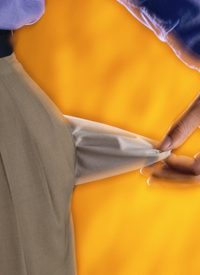
David Rosenberg of Gluskin Sheff, a Canadian private money management firm, noted at the time that consumers were still trying to reduce their debt load, which reduces their ability to purchase consumer goods and services. That continued reduction in demand is being felt all across the economy with no end in sight:
We still have this credit contraction shock as it pertains to the broad consumer sector…. Recession risks are as acute as they were a year ago, but with far less certainty that the Fed and Congress have another rabbit to pull out of the hat.
But that was then. This is now: Rosenberg says the economy is now on the brink of that recession. With poor job numbers, increasing inflation (especially in food and gasoline), a slowing manufacturing sector, and the continuing housing slump, consumers are continuing their retreat:
Everything is telling you how soft the underbelly of the economy really is. We’re just one small shock away from the economy going back into recession.
Technically speaking, a recession is defined as two consecutive quarters of negative growth, and so if the GDP goes negative this fall, Rosenberg would treat it as a second recession coming right on top of the current one: “It is absolutely not normal to have two soft patches this close together nearly two years after the [current] recession. It doesn’t happen. This will be two separate recessions.”
Economist Gary Shilling may just have provided that “one small shock,” with his estimate on Friday that prices in the housing market are due to drop another 20 percent. His case for a second recession is persuasive and daunting. In good years, 1 ½ million new homes are built annually. With the current overhang of 2 to 2 ½ million homes in excess inventory, primarily through foreclosures, Shiller expects it will take four to five years for the market to clear that inventory and get back to some sort of normal. But if prices drop another 20 percent in order to clear the market, that will force price declines on existing homes that will move the number of underwater mortgages from the current level of one in five to more than one in three. The ripple effect of that will drive the economy into the second recession, according to Shiller.
And he gets support from James Saccacio, the CEO of RealtyTrac which follows foreclosures. He estimates that at least a million foreclosures that should take place this year will be pushed back into 2012:
This casts an ominous shadow over the housing market where recovery is unlikely to happen until the current and forthcoming inventory of distressed properties can be whittled down to a manageable number.
Consumer polls are reflecting their negative attitudes about the economy. A Reuters/Ipsos poll released last Wednesday showed that 63 percent of those polled think the country is on the wrong track, up from 60 percent in June. The University of Michigan’s index of consumer sentiment dropped to 63.8 in July, the lowest in over two years. Economists had expected that number to come in at 72.5. Another report from the Fed on factory activity dropped again in July showing persistent weakness there. And Rasmussen’s Consumer Confidence Index declined again on Saturday, down 8 points from a month ago and 9 points from three months ago, and is approaching the lowest reading in two years.
So much for green shoots. It was JPMorgan’s chief economist, Bruce Kasman, who first uttered the phrase in February of 2009: “It’s too early to get excited, but I think there are a couple of green shoots that say we’re not going down as heavily in the first quarter [of 2009] as we were in the fourth quarter [of 2008].” A month later Fed chairman Ben Bernanke picked up the phrase in an interview with CBS’s 60 Minutes, and in June (two years ago now) Bernanke said:
I think as those green shoots begin to appear in different markets and as some confidence begins to come back that will begin the positive dynamic that brings our economy back.
There is one green shoot, however, that the media seem to be missing. With every step down in the economy, the President’s reelection chances also decline. According to Julie Clark, a pollster for the Reuters/Ipso poll, if the economy doesn’t start to generate some jobs and the economy begin to show some signs of life soon, then “Obama will be in for a real challenge in getting re-elected next year. “
Economically speaking, that’s a green shoot to look for.



